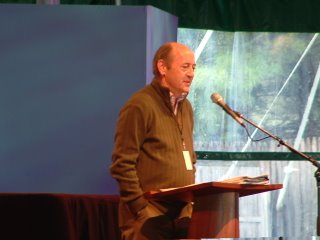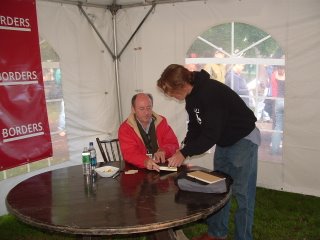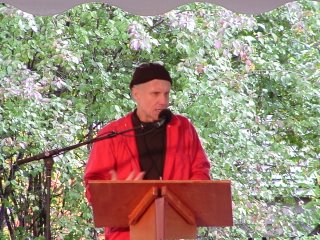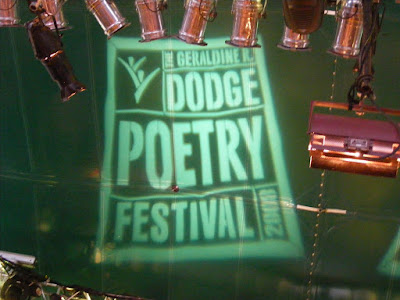Friday was Teachers' Day
at the Geraldine R. Dodge Poetry Festival
in Waterloo Village, Stanhope, N.J.
 Waterloo Village - an inspiring place for poets to gather
Waterloo Village - an inspiring place for poets to gatherEarly morning visitors trucked through light and intermittent rain, but the festival organizers cast a spell that prevented precipitation during the day's events.
Educators and poets on 'bus-man's holidays' wandered the wooded trails, stepped around puddles and found the poets on stage working through images, the what it said, the how it said it, the what it meant, the why it works.
Plus, each talking poet seemed to focus at some point in the discussion on how to get students interested in poetry - writing and reading and understanding it.
 Billy Collins, former U.S. Poet Laureate
Billy Collins, former U.S. Poet LaureateBilly Collins, U.S. Poet Laureate from 2001 to 2003, collects definitions of poetry the way some people collect plastic monkeys, or baseball cards, because "poetry is such a slippery word."
(Samuel Taylor) Colleridge defined poetry as "the best words in the best order," Collins noted. (W.H.) Auden defined it as a "clear expression of mixed feelings."
And, Archibald MacLeish called it a "synthesis of hyacinths and biscuits."
Simply put, Collins said, "Poetry is a home for ambiguity."
Poets are "prose avoidance systems." He explained that poets don't write to the end of the line because they don't want to be journalists.
 Collins signs one of his many poetry books for a long line of fans.
Collins signs one of his many poetry books for a long line of fans."Poetry lifts prose into pleasure," Collins said. Prose is written in sentences while poetry is written in lines.
Collins' work is often remembered because of the humor that serves as a thread or punch line in his verse. He acknowledged wordplay - something ALL POETS DO IN CHOOSING THE RIGHT WORD - and conceded his work is influenced by years of watching Merry Melody andn Loony Toons cartoons. He wasn't a Hanna-Barbera man.
He said he delighed when the cartoon character pulled a lawn-mower out of his pants, whether or not he was wearing pants in the first place. Collins cited a poem with a character on a bridge, and then then character on the bridge disappearing in the poem's next line. You can't do that in a novel, he said.
Collins addressed the educators in the packed-out main stage, "What is the poet trying to say? The implication is that they all failed."
Citing Emily Dickinson, when Collins shook his head sadly and said, "she couldn't say it but she gave it a good try," the teachers erupted in laughter and applause.
Calling it the one question a student should never ask his teacher upon returning from an absence, Collins read Tom Wayman's poem DID I MISS ANYTHING.
"Poetry is an interruption of silence," Collins said, citing the silence that turns up in song.
He admitted, "There's something wacky in my poetry and I know I try my best."
 Poet Tony Hoagland talks about "Orange Bears"
Poet Tony Hoagland talks about "Orange Bears""Poetry - it can take a moment and freeze it, slow it down, detail it... look into it," said poet Tony Hoagland.
Poetry, he says shows "what it's like to be inside that moment."
By reading each other's poetry and getting into the idiom, Hoagland explained, the speech, the behavior, and the costumes all as idiums in the poetry "links us together."
Hoagland said that a poem in another's idiom, or regionality, or specialty, should be understandable. "Anything you need to understand the poem is in the poem," or should be.
As an example he said if you write about combustable formula xyz, you should also work in that you are writing about rocket fuel.


